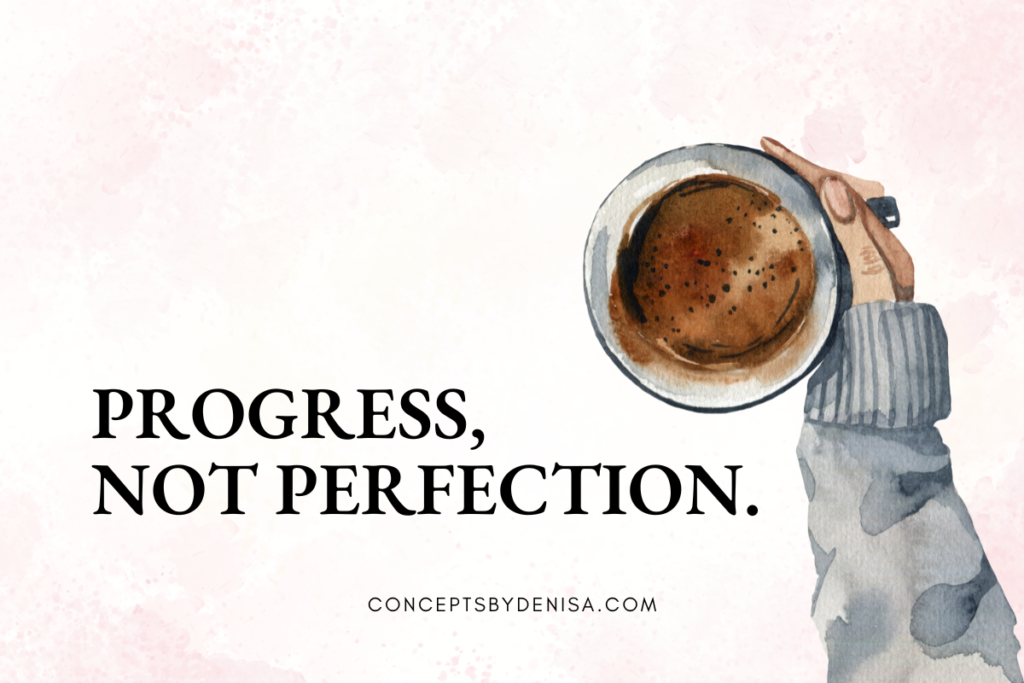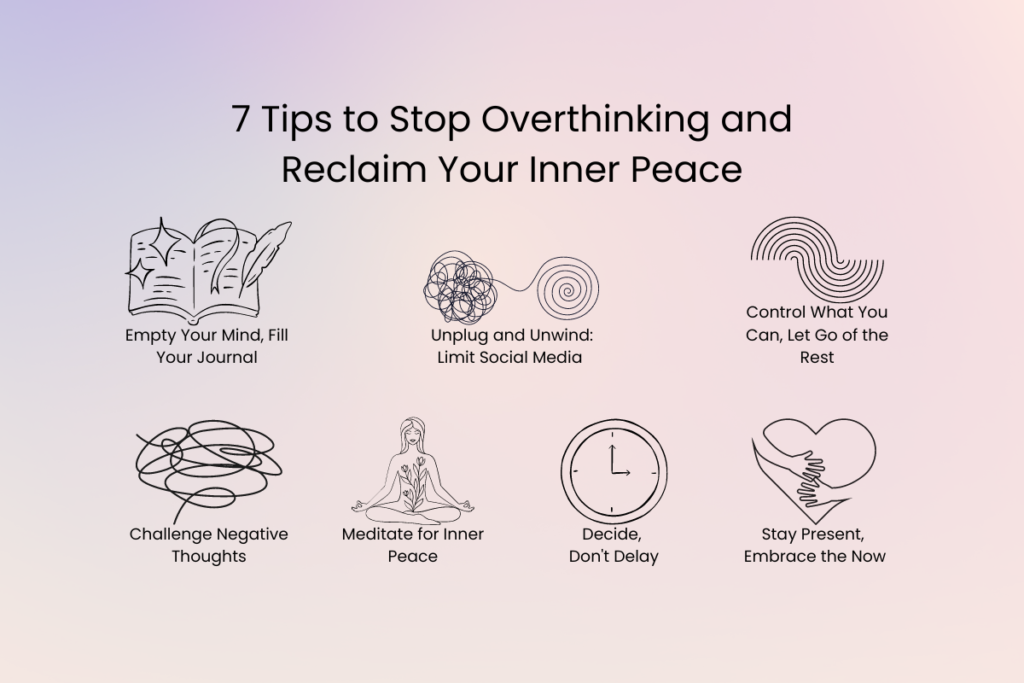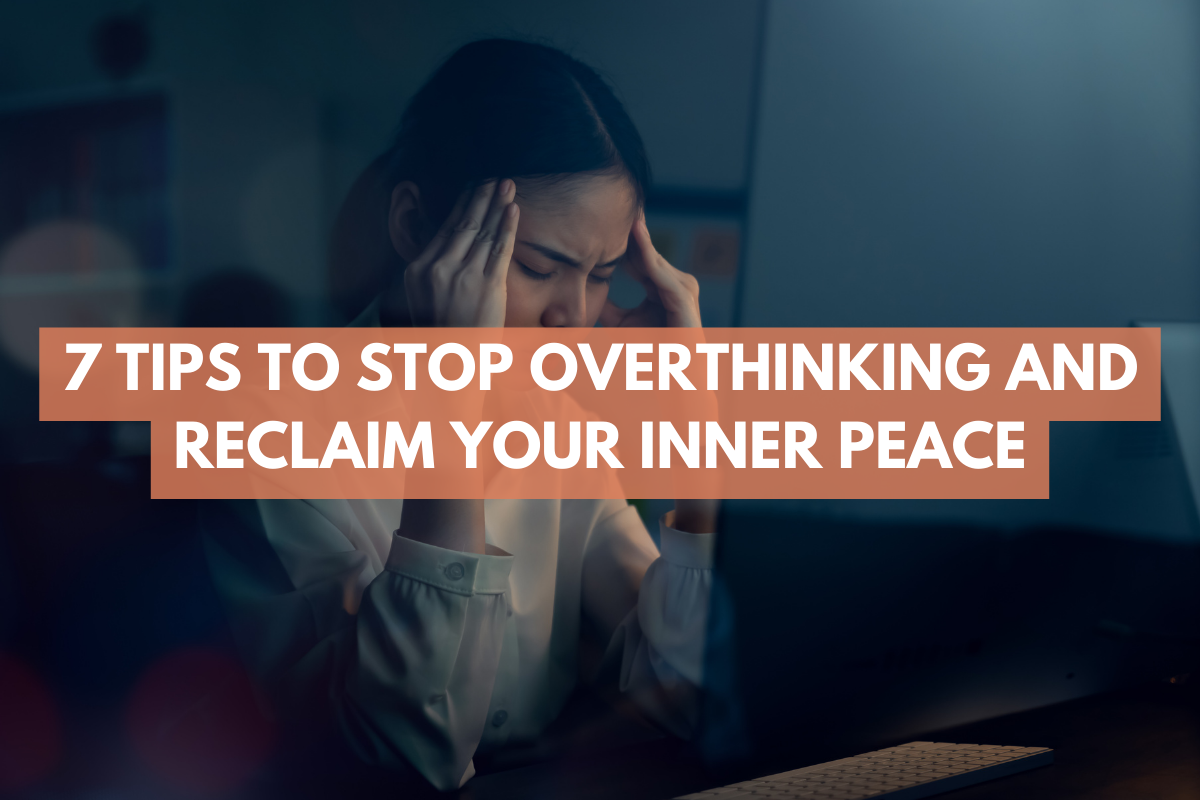Do you ever feel like your brain is a hamster on a wheel, endlessly replaying past conversations, dissecting future possibilities, and getting tangled up in every “what if” scenario imaginable? If you answered yes, then you’re definitely not alone. Overthinking is a common human experience, but when it becomes chronic, it can affect our mental well-being, leaving us feeling anxious, overwhelmed, and paralyzed by indecision. The good news is, there are effective strategies to reduce overthinking and reclaim your mental peace. These strategies don’t involve silencing your thoughts altogether (that’s pretty much impossible!), but rather learning to manage them in a way that empowers you.
In this blog post, we’ll explore 7 powerful tips that can help you stop overthinking and cultivate a calmer, more present state of mind. By incorporating these practices into your daily routine, you’ll be well on your way to silencing the overthinking monster and reclaiming your inner peace. So, grab a cup of tea, find a comfy spot, and let’s dive in into these 7 tips to stop overthinking.

Empty Your Mind, Fill Your Journal
Sometimes, the sheer volume of thoughts swirling around in our heads can feel paralyzing. When faced with a barrage of worries, anxieties, and to-do lists, it’s easy to get overwhelmed and stuck in a cycle of overthinking. One effective strategy to combat this is to externalize your thoughts by journaling.
Grab a pen and paper (or your favorite note-taking app) and do a brain dump. Write down everything on your mind, no matter how big or small, silly or serious. This could include worries about an upcoming deadline, anxieties about a social event, or random ideas that pop into your head. The act of physically writing your thoughts down serves a dual purpose. First, it clears space in your mind, allowing you to see things more clearly and identify what truly needs attention. Second, by putting your thoughts on paper, you can often gain perspective and recognize that many of your anxieties are less daunting than they initially seemed.
Decide, Don’t Delay and stop Overthinking
Procrastination and indecision are two of the best friends overthinking can have. When faced with a choice, big or small, the tendency to put it off can lead us down a rabbit hole of overanalyzing every possible outcome. This not only delays progress but also fuels anxiety as the decision continues to loom.
To combat decision fatigue, set time limits for making choices. This anxiety relief technique could involve allocating 10 minutes to pick an outfit for the day, an hour to research a new product you’re considering buying, or a dedicated afternoon to tackle a larger, more complex decision. By imposing a time constraint, you force yourself to focus on the key factors and make a choice, even if it’s not perfect.
Furthermore, reframe your mindset around decision-making instead of dwelling on analysis paralysis. Instead of viewing it as a daunting task fraught with potential pitfalls, see it as an opportunity to take control of your life.
Unplug and Unwind: Limit Social Media and News
In today’s hyper-connected world, we’re constantly bombarded with information, much of it negative. Social media feeds can be breeding grounds for envy and comparison, while news outlets often prioritize sensational headlines that stoke fear and anxiety. This constant barrage of negativity can be a major trigger for overthinking. The fear of missing out (FOMO) fueled by social media can lead us to compare our lives to others’ carefully curated online profiles.
To protect your mental wellbeing and stop overthinking tendencies, consider setting healthy boundaries around social media and news consumption. Schedule specific times to check your social media feeds and stick to them. Avoid mindlessly scrolling before bed, as the blue light emitted from electronic devices can disrupt sleep patterns and exacerbate anxiety. Be mindful of the news sources you consume and limit your exposure to outlets known for negativity bias. Seek out positive and uplifting content that inspires and motivates you.
Control What You Can, Let Go of the Rest
A significant portion of overthinking has its roots in things outside our control. We analyze past events we can’t change, worry about future uncertainties, and stress over external factors beyond our control. This constant mental ping-pong between the past and the future can be incredibly draining and leave us feeling powerless and tired.
To stop this cycle, it’s crucial to identify your circle of control. This refers to the aspects of your life that you can directly influence through your actions, choices, and behaviors. Your circle of control includes things like your daily routine, your self-care practices, your reactions to situations, and the effort you put into your work or relationships.
Meditate to Stop Overthinking
There are many different meditation techniques available, from mindfulness meditation, which focuses on cultivating present-moment awareness, to guided meditation. Regardless of the specific technique you choose, regular meditation practice can significantly reduce overthinking and promote feelings of inner peace. Studies have shown that meditation can improve focus, reduce stress and anxiety, and enhance emotional regulation – all of which contribute to a calmer, more present state of being.
Consider incorporating just a few minutes of meditation into your daily routine, whether it’s first thing in the morning, during your lunch break, or before bed. Many meditation apps and online resources offer guided meditations for beginners, making it easier than ever to embark on your journey towards personal growth and a quieter mind.
Stay Present, Embrace the Now
Overthinking often involves dwelling on the past. This tendency can significantly hinder our personal growth and productivity. Ruminating on past mistakes or failures keeps us stuck in a cycle of regret and self-blame, hindering our ability to learn, adapt, and move forward. Similarly, fixating on worst-case scenarios about the future creates anxiety and fear, paralyzing us and preventing us from taking action towards our goals.
Mindfulness practices, such as meditation and mindful breathing, offer powerful tools to cultivate a sense of presence and stay anchored in the now. By focusing your attention on the present moment, you can disengage from the unhelpful mental chatter of the past and future. This allows you to approach challenges with greater clarity, focus on the task at hand, and maximize your productivity. Mindfulness also plays a crucial role in developing self-discipline. By becoming more aware of your thoughts and emotions, you can learn to observe them without judgment and choose how you want to respond. This empowers you to resist distractions, stay focused on your goals, and cultivate the mental discipline needed for sustained personal growth.
Challenge Negative Thoughts
Our thoughts aren’t always our friends. When overthinking strikes, it often manifests in the form of negative self-talk and distorted thinking patterns. These cognitive distortions, such as catastrophizing, filtering out positive experiences, and mind reading, can fuel anxiety and make us feel powerless and tired.
When you find yourself caught in a cycle of overthinking, take a step back and question your thoughts. Are they based on evidence, or are you catastrophizing a situation? Are you focusing solely on the negative aspects of an experience, while overlooking the positive? By learning to identify and challenge cognitive distortions, you can reframe your thoughts in a more balanced and realistic way. This not only reduces anxiety but also fosters resilience by empowering you to take control of your thought processes.
In conclusion, overthinking can be a real burden, but it doesn’t have to control your life. By incorporating these powerful tips into your daily routine, you can quiet the mental chatter, cultivate inner peace, and approach life with greater clarity and confidence. Remember, progress, not perfection, is the key. Be patient with yourself, celebrate your victories, and enjoy the journey of creating a calmer, more present mind.
Don’t forget to pin this:






